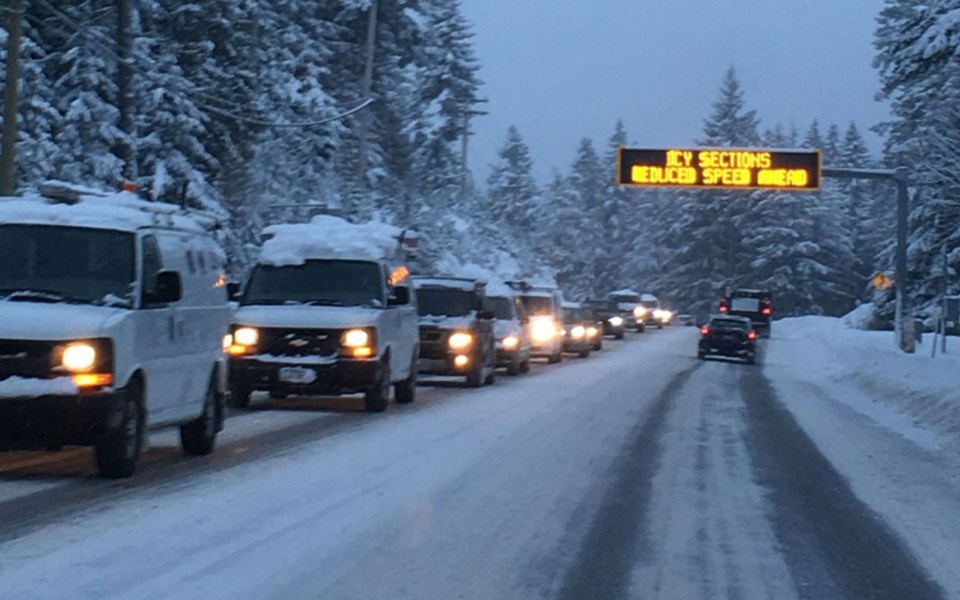Well, we now know that the fight against the coronavirus doesn’t stand a chance against 30 centimetres of fresh powder and the thumbs-up to travel from the Lower Mainland to recreate in Whistler—if you have a connection.
“Day trips are less risky with your family, your household,” said B.C.’s top doctor, Bonnie Henry, last week when asked about coming to ski at Whistler given the huge surge of cases recently.
“If you’re somebody who works or has strong connections and lives partly in Whistler, then yes, that is your local ski hill,” she explained.
“It’s not the skiing itself that seems to be the risk. It’s the things that we’re doing before and after—if we are staying over, having people over.
“The risk is not on the ski hill. We are working with the industry, with all of the industries involved, to come up with a community way of supporting this.”
If the traffic line-ups arriving here from the south, the state of the parking lots and the line-ups up to ski and board were any indication last weekend, then what everyone heard was, “blah, blah, blah... then yes, that is your local ski hill.’”
On Monday, Feb. 1, other commentators, including the Minister of Public Safety and Solicitor General Mike Farnworth, were trying to put the travel-advisory message back on track. Asked about Henry’s comments on CBC’s The Early Edition, he said: “I don’t believe that a ski day in Whistler is essential travel…
“People shouldn’t be going on unnecessary travel, and in my view, I wouldn’t be going skiing.”
We do have to realize that short of closing the highway both north and south and hunkering down, there is no way the community was going to avoid the coronavirus. It was always going to impact us and make us sick.
Indeed, I would argue it was amazing that we lasted as long as we did without the type of major impact we have seen and continue to see since the Christmas and New Year’s holiday season.
Most of Whistler’s cases are in its young workforce, many of whom may work at more than one job and most of whom live in shared housing. Our local medical leaders tell us that the majority of these residents are not out partying or having people over to socialize. And, too, unlike our seniors, few seem to come out of a COVID-19 infection with long-term impacts.
But impacts there are, nonetheless—and not just on the health front. Few businesses here have spare employees they can just call in to reopen, for example. The infection plays out as a domino effect from the risk to personal health, to employment, to housing, purchasing power and especially on our mental health and relationships.
A year into the pandemic, many businesses are not in a position to pay employees if they are off sick with COVID-19 no matter how much they want to. If they’re being forced to shut down, well, again, just sit for a moment and connect the dots for local business on that scenario.
It is infuriating to be in this position with the prospect of vaccines tantalizingly close and yet the threat to the very fabric of our community staring at us. (I understand that without support from the federal and provincial governments for local businesses it would be much worse, but still…)
The federal government has deployed almost 500,000 doses of both the Pfizer-BioNTech and Moderna vaccines to distribution sites across the country since mid-December, but the actual rollout of vaccinations is up to the individual provinces and territories.
As of Feb. 2, close to 139,000 doses have been administered in B.C.—with 0.09 per cent of the population vaccinated.
Our World In Data shows that vaccination data doses per 100 people in Canada at 2.5 as of Jan. 30, compared to 8.4 in U.S., 13.1 in the U.K. and 53.8 in Israel.
Moderna announced Friday that it is cutting vaccines to Canada by 50,000—three-quarters of the expected supply.
Canada is ramping up its own vaccine production we learned this week—and it’s about time.
Said Dr. Alan Bernstein, a leading Canadian health expert on the federal government’s COVID-19 Task Force to CBC this weekend: “I think the sooner we get on with it, the better.
“We need domestic vaccine production capacity in the country for the next pandemic, and also for this pandemic. If there are variants arising, we may be designing second, third-generation vaccines and vaccinating the population for the next two or three years.”
What is needed now is political leaders—indeed, community leaders—to step up and lead, whether that is at the federal, provincial or local level.
If, for example, coronavirus is running wild through our local workforce because of staff housing and cramped, shared accommodation, could we not as a community full of empty tourist accommodation find a way to spread them out and offer isolation?




